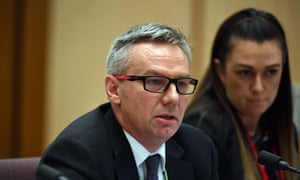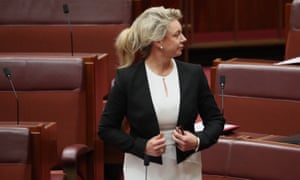The government has consistently defended scandal-ridden program
overseen by Bridget McKenzie by saying all the projects funded were
eligible
Some 43% of projects funded under the controversial $100m sports grant program overseen by Bridget McKenzie – 290 in total – were ineligible, according to officials from the Australian National Audit Office.
The evidence from the ANAO to the Senate inquiry on Thursday contrasts with the defence of the program employed by Scott Morrison and the former sports minister, who had claimed that “no ineligible projects” were funded under the scheme.
ANAO officials also revealed the prime minister’s office made “direct” representations about which projects to fund, and the Liberal National Party of Queensland submitted a wish-list of projects in a key marginal seat.
In a scathing report the ANAO found the $100m community sport infrastructure fund was targeted at marginal or Coalition target electorates, after McKenzie departed from Sport Australia’s assessment to select projects from spreadsheets colour-coded by electorate.
Before McKenzie resigned on 2 February over a conflict of interest in one grant, she and Morrison had said no ineligible projects were funded. They cited the ANAO’s report, which said “no applications assessed as ineligible were awarded grant funding”.
But on Thursday, Brian Boyd, the ANAO performance audit services
group executive director, told the Senate inquiry “that’s not what we
found”.The evidence from the ANAO to the Senate inquiry on Thursday contrasts with the defence of the program employed by Scott Morrison and the former sports minister, who had claimed that “no ineligible projects” were funded under the scheme.
ANAO officials also revealed the prime minister’s office made “direct” representations about which projects to fund, and the Liberal National Party of Queensland submitted a wish-list of projects in a key marginal seat.
In a scathing report the ANAO found the $100m community sport infrastructure fund was targeted at marginal or Coalition target electorates, after McKenzie departed from Sport Australia’s assessment to select projects from spreadsheets colour-coded by electorate.
Before McKenzie resigned on 2 February over a conflict of interest in one grant, she and Morrison had said no ineligible projects were funded. They cited the ANAO’s report, which said “no applications assessed as ineligible were awarded grant funding”.
Boyd agreed that no projects that had been assessed as ineligible by Sport Australia were granted funding. But ineligible projects were funded due to McKenzie accepting late applications and because circumstances changed between the assessment and the time that funding agreements were concluded, he said.
The 290 ineligible projects that were funded included:
- 272 projects that had started work by the time agreements were signed;
- eight that had completed work before the agreement was signed;
- five late applications that were accepted; and
- four applications that were amended after they were assessed.
At a media conference to discuss the extension of the coronavirus travel ban, Morrison was caught by surprise by the revelation. “I haven’t seen that evidence, I haven’t seen that statement, I will review that,” he told reporters in Canberra.
Boyd also revealed the Queensland LNP sent the minister a list of projects it was “fighting for” in the Labor-held seat of Longman, one of several seats picked up by the Coalition to secure re-election in May 2019.
Morrison has so far insisted that his office’s role in the program had been limited to passing on representations from MPs.
But ANAO officials said representations from the prime minister’s office were both indirect – made on behalf of others – and direct.

Asked about media reports that the prime minister’s office had contacted McKenzie to advise that some projects had been funded through other programs and asking for “a slight adjustment”, Boyd said that was “not particularly unusual” and an example of the “direct” representations made by the prime minister’s office.
But the auditor general, Grant Hehir, said that not all representations changed the outcome of funding decisions and the ANAO did not find sufficient correlation between representations and an outcome to make it a focus of the audit.
“The evidence before us was that the minister was the decision-maker,” he said. “If we had have identified someone else as the decision-maker, we would have gone down that path.”
Hehir concluded that the community sport infrastructure grant program was “not informed by appropriate assessment process and sound advice”.
He reiterated the ANAO’s conclusion that it was “not evident” what McKenzie’s legal authority was to make grants, and noted that Sport Australia had also expressed its concerns.
“It is poor practice for entities to be instructed what their advice should recommend rather than providing their own recommendations that are developed through an evidence-based approach,” Hehir said.
“Potential applicants and other stakeholders have a right to expect program funding decisions will be made in a manner and on a basis consistent with published program guidelines.”
In the hearing, the National party senator Matt Canavan defended McKenzie for considering projects by electorate and by the party which held them, suggesting she needed to do so to avoid adverse findings that Coalition seats had benefited disproportionately.
He cited a 2010 ANAO report finding that Labor electorates benefited disproportionately from stimulus projects.
Canavan noted applicants were aware the minister retained a discretion to disagree with Sport Australia. Boyd countered that applicants were entitled to assume this did not extend to criteria they had not been told about.
The ANAO did not interview anyone in the prime minister’s office, but had dozens of emails exchanged between that office and McKenzie’s, and interviewed current and former staff from McKenzie’s office under oath.
Consultation with the prime minister’s office included the controversial colour-coded spreadsheets, which went through at least 28 iterations as decisions about projects to be funded changed.
Hehir told the inquiry he had not seen the report by the head of the Department of the Prime Minister and Cabinet, Phil Gaetjens, which found McKenzie had breached ministerial standards only with respect to one $36,000 grant to the Wangaratta Clay Target Club, of which she was a member.
Labor has pursued the Gaetjens report in the Senate but the government has blocked its release, claiming it reveals cabinet deliberations.
A government spokesman reiterated that the ANAO report had said “no applications assessed as ineligible were awarded grant funding”.

No comments:
Post a Comment